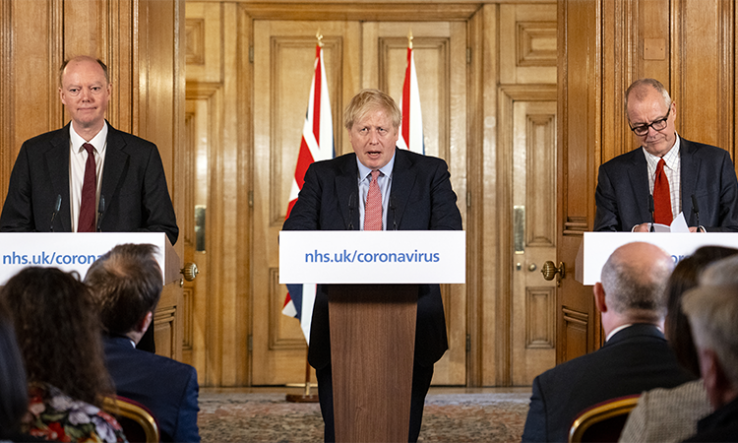
Image: Number 10 [CC BY-NC-ND 2.0], via Flickr
Community-based diagnostics crucial to tackling disease, says Patrick Vallance amid global race for better tests
The top science adviser to the UK government has said that more testing for Covid-19 will be crucial to tackling the pandemic in the country.
“Testing and data flows will be critical to get this right,” government chief scientific adviser Patrick Vallance told the Health and Social Care Committee in the House of Commons on 17 March.
“I think we need a big increase in testing,” he said. “The quicker we can get to a true community-based test, the better.”
Vallance said he expected the capacity for testing to ramp up from the current 4,000 tests in England a day. He has also defended the UK’s performance, although other countries—such as South Korea—have tested at a much higher rate.
“Lots of people claim to have tests and there are laboratory tests that can be done,” Vallance said.
He added that Public Health England, the NHS and the Department for Health and Social Care are doing a lot of work “to select which tests we go for and how that can be ramped up, possibly by the private sector so we can get things out there fast on the community side”.
Vallace’s comments followed similar remarks by chief medical officer Chris Whitty on 16 March, which were widely welcomed by researchers.
Some saw the comments as a U-turn, as testing in recent days has been focused on people in hospitals who have symptoms.
“I am pleased to see a desire to increase testing,” said Anne Johnson, vice-president international at the Academy of Medical Sciences.
“Identifying people who are infected and ill, isolating them and their households until they are better, will reduce the risk of passing the infection to others,” Johnson said. “This is an essential step to spread the peak of the epidemic over a longer period of time and, in turn, reduce pressure on the health and social care system so that we can look after the most vulnerable in society.”
Jonathan Ball, professor of molecular virology at the University of Nottingham, said that “far more widespread testing” will be “crucial to slow the virus down, and this will require innovative ways of acting, not least exploring means or expanding capacity outside the NHS and drawing on the wide-ranging expertise up and down the country”.
Global race for diagnostics
The challenge goes beyond the UK, and is a familiar one to global diagnostics experts.
“Diagnostics are fundamental to the identification, containment and eventual resolution of disease outbreaks,” said Sarah-Jane Loveday, head of communications at the global non-profit Foundation for Innovative New Diagnostics (FIND) in Geneva, Switzerland. “Poor diagnostic capacity compromises surveillance activities, outbreak detection and response, both at a national level and in community healthcare settings.”
Diagnostics are imperative for rapid vaccine development, to inform epidemiological understanding and create well-targeted vaccination efforts, Loveday added.
But when there is no outbreak, she said, “there is very little investment in infrastructure to support scale-up of diagnostics for outbreaks so, for example, there are no existing dedicated manufacturing lines in place—these now need to be created from scratch”.
More funding is “urgently needed” in the UK and globally for developing more agile Covid-19 tests, she said. “Early detection and testing capacity is key and needs a dedicated push.”
“While current tests are considered accurate, their use is restricted to central health agencies and accredited laboratories. This centralised, lab-based approach is slow and resource intensive—limiting capacity to accurately track the disease and identify patients before their infection is widely passed on,” said Loveday.
“There is a critical requirement for quicker tests that can be deployed in hospitals and primary care clinics—and thus a huge amount of commercial activity is currently underway to develop new tests that can be used in these settings.”
FIND is working with the World Health Organization and is tracking the diagnostic pipeline for Covid-19 of over 130 diagnostics—most of which are already commercially available, but are now being evaluated independently.
A FIND call for test developers interested in having their tests for Covid-19 evaluated is open until 20 March.
UPDATED 18/03 After this story was published, the government said it was working “to increase the number of tests that can be conducted by Public Health England and the NHS to 25,000 a day” within 4 weeks. It said that the industry would be given whatever support it needs to help government increase testing capabilities, including to rapidly develop tests to establish whether people have developed immunity.